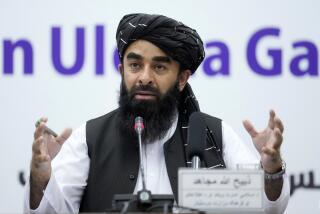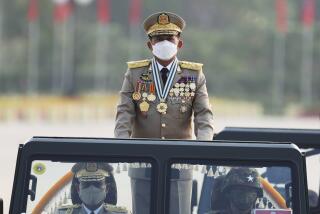Afghan President Vows to Fight On After Soviets Go
- Share via
NEW DELHI — President Najibullah of Afghanistan said Friday that his military is strong enough to “deal a heavy and severe blow” to rebel forces even after Soviet troops begin pulling out of Afghanistan next week.
At a news conference at the end of a three-day state visit to India, Najibullah said he has no intention of resigning as president of Afghanistan to make room for a leadership more acceptable to the Washington-backed rebels.
However, he said that Afghanistan’s deposed King Mohammed Zahir Shah, 74, who lives in exile in Rome, would be welcome to take part in a broad-based coalition government.
He said his government also would be willing to include moderate elements of the rebel alliance, which consists of seven groups.
Najibullah appealed to the rebels, who for eight years have been fighting Soviet and Afghan government forces, to stop the fighting and take part in the political process of national reconciliation.
“Should they continue in armed operations,” he warned, “then the armed forces of the Republic of Afghanistan are fully prepared to deal them a heavy and severe blow.”
U.S. officials think the Najibullah government will fall quickly under internal and external pressures once most of the estimated 115,000 Soviet troops have left under a nine-month timetable spelled out in the peace agreement signed April 14 in Geneva.
Najibullah’s party, the People’s Democratic Party of Afghanistan, has long been split by bitter rivalries. Najibullah is a member of the Parcham (Flag) faction, which has fewer followers than the Khalq (Masses) faction. Moreover, there have been divisions within the Parcham faction since President Babrak Karmal was summarily replaced two years ago by Najibullah, a physician and former chief of the secret police.
It is not at all certain, many Western observers believe, that the Afghan army will continue to support the Najibullah regime once the Soviets pull out. At most, these observers say, the regime can depend on about 50,000 armed men, militiamen and members of security forces, against about 200,000 rebels, the moujahedeen.
“Our estimate is that the government could splinter and fall even before the final Soviet pullout,” Robert A. Peck, a deputy assistant secretary of state, said last month.
A Western diplomat said Friday in New Delhi, “We are not saying it will happen in 20 minutes, or even in two months, but by eight months Najibullah should be gone.”
In the face of such skepticism about his regime’s ability to cling to power without Soviet help, Najibullah visited India this week--encouraged by the Soviet Union and with the Indian government’s cooperation--in an attempt to improve his regime’s image.
He met twice with Prime Minister Rajiv Gandhi and was greeted with all the pomp and ceremony associated with a visiting head of state. With lower-level officials he discussed trade issues and a possible role for India in Afghanistan’s postwar reconstruction.
In news briefings, Indian officials tried to put a good face on the visit. They said India’s main fear is that Najibullah will be overthrown and that this will lead to a government hostile to Indian interests in the region.
“Najibullah is really not such a bad fellow,” one official said.
But in some quarters the Najibullah visit was not well regarded. A front-page cartoon in the opposition newspaper Indian Express, India’s largest English-language daily, suggested that the visit was a result of Soviet pressure on the Indian government.
More to Read
Sign up for Essential California
The most important California stories and recommendations in your inbox every morning.
You may occasionally receive promotional content from the Los Angeles Times.













